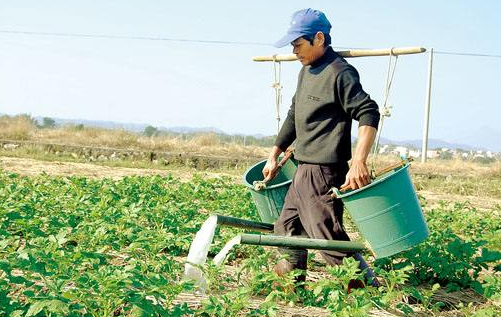The application of the base fertilizer potato is mainly based on base fertilizer, which generally accounts for 70% to 80% of the total fertilization amount. The base fertilizer is often applied in combination with organic fertilizer and chemical fertilizer, and is applied in combination with soil preparation or soil covering. The base fertilizer is based on the application of 2500~3000 kg of high-quality organic fertilizer per acre, and 60-80 kg of compound fertilizer of Shiluxi series. Because of the early growth of the potato, the absorption of nitrogen and potassium nutrients is more. In addition, due to the low temperature of the spring potato, the base fertilizer should be applied with nitrogen fertilizer, or the nitrogen fertilizer should be traced early to promote the early growth of the potato seedlings. Therefore, under the premise of supplementing the amount of phosphorus nutrients, the application of nitrogen and potassium fertilizer should be repeated.
When the application of the seed fertilizer is insufficient, or when the cultivated land is too late to fertilize, it is often used as a seed fertilizer when planting a special compound fertilizer of 15 to 20 kg. The application of seed fertilizer is mainly carried out by means of ditch application or acupoint application, but the fertilizer should not be in direct contact with the seed potato to avoid burning the seed potato.

Early application of topdressing nitrogen fertilizer should not be too late in topdressing, especially in the later stage, to avoid stems and leaves and affect tuber enlargement and quality. In the middle and late period, potassium fertilizer is the main method. Can be divided into 2 to 3 applications, the first time after the seedlings to topdress, promote early hair, increase the area of ​​photosynthesis. At this time, nitrogen fertilizer accounts for 30% of the nitrogen application rate, and potassium fertilizer accounts for 20% of the total potassium application rate. At the time of the bud, the second top dressing is carried out to promote the continuous growth of the stems and leaves, and increase the area of ​​photosynthesis, which is conducive to the expansion of the tuber. This top dressing is generally applied to 20% of total nitrogen application and 40% of total potassium application. Top dressing should be carried out in the afternoon, and the fertilizer should be avoided. After flowering, it is generally no longer topdressing. If the phenomenon of de-fertilization and premature aging is manifested in the later stage, phosphorus and potassium fertilizers can be combined with trace elements for foliar application. So as not to cause the upper part of the ground to grow, increase nutrient consumption. Topdressing is mainly based on the application of potassium fertilizer, supplemented by nitrogen fertilizer, in order to effectively increase the photosynthetic area, promote tuber enlargement and increase yield.
Appropriate root-external topdressing potatoes have a relatively large demand for micronutrients such as calcium, magnesium, sulfur, boron, zinc, etc. Therefore, it is necessary to combine external soil fertility conditions and potato growth conditions, and timely external fertilization (generally referred to as foliar surface) Fertilization) to increase potato resistance and yield. From the time when the potato seedlings began to spread, every 7 to 10 days, the leaves were topped with 0.1% magnesium sulfate, 0.3% potassium dihydrogen phosphate, 1000 times triacontanol mixture, sprayed 3 to 5 times, evenly sprayed. Wet blades.
Supplementing the period of rapid expansion of the underground tuber of magnesium fertilizer potato, 50-60 grams of magnesium sulfate per plant, drenched with clear water or decomposed manure, or digging shallow ditch around the plant to promote rapid expansion of underground tubers.
Avoid applying chlorine-based potato to avoid chlorine crops. Do not apply potassium chloride or compound fertilizer containing chloride ions. Rational fertilization is a prerequisite for high yield and stable yield of potato.
21" Sanitary Sleeve For Embryo Transfer
21 Inches Sanitary Sleeve,Disposable Sanitary Chemise,Embryo Transfer Cover,Et Sheath Cover
Jinan Mucho Commercial Inc. , https://www.muchovet.com